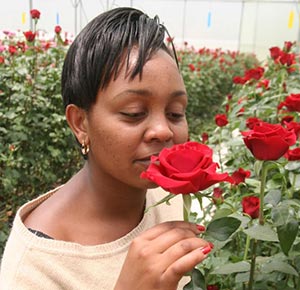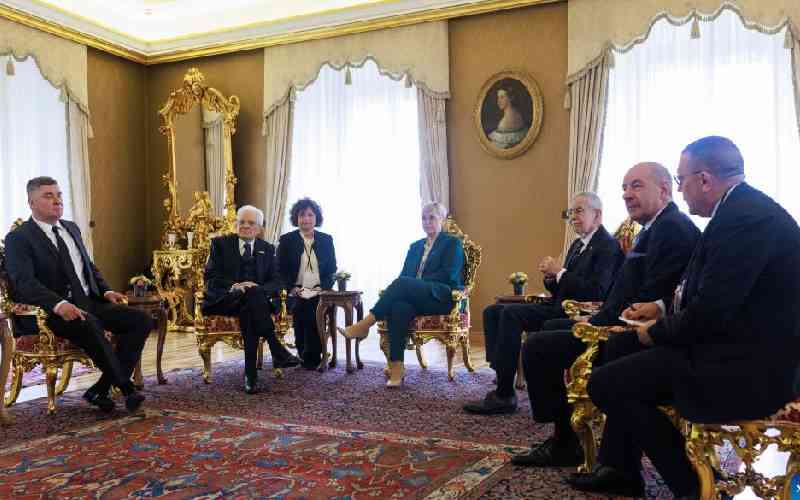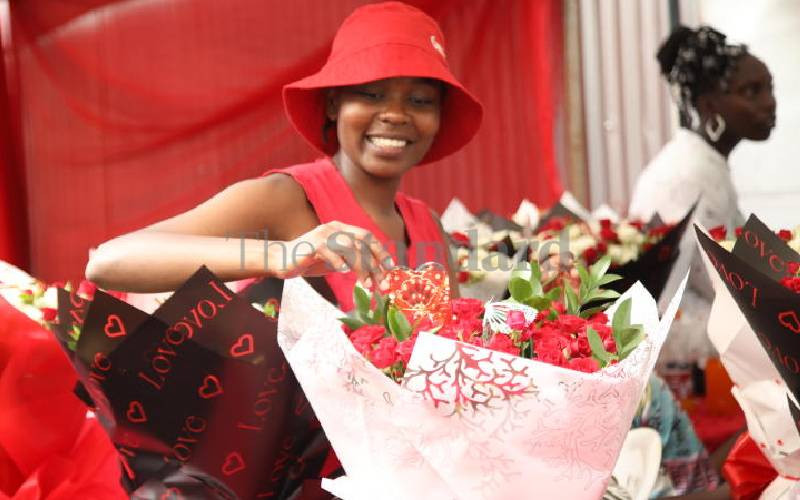 |
|
Rose Nguku of Lex+ Farm in Naivasha smells a rose. Starting today, Kenyan exports such as flowers, fruits and vegetables entering the European market will not attract any tariffs. [Photo: Antony Gitonga/Standard] |
Kenyans received a rare Christmas gift yesterday after the European Union (EU) removed taxes levied on exports from the country to the 28-member trading bloc. Starting today, Kenyan exports such as flowers, fruits, fish and vegetables entering the European market will not be subject to any tariffs.
Kenyan exporters paid out an estimated Sh1 billion in taxes to EU countries since October 1, when Kenya lost duty-free market access to the bloc.
“I am very happy to confirm that as of Christmas Day (today), Kenyan goods – cut flowers, fresh produce and much more – will once again enter the European Union market without tariffs or quota limits,” said Lodewijk Briët Head of the European Delegation in Nairobi. Agriculture Principal Secretary Sicily Kariuki said this would help Kenya grow its exports in a bid to maximise farmers’ income and enhancing national revenue.
She said this would also enable local producers to grow their industries.
“This is brilliant. The issue of duty is now behind us and our focus is to grow the agriculture sector to stimulate more development in the national economy. Further, the clearance by EU gives us an opportunity to accelerate the pace of fighting setbacks that have been hindering growth of the various sub-sectors,” she told The Standard by phone.
Until September, Kenya had enjoyed unlimited and free access to the EU market but after the October deadline, local exports started attracting duty of between four and 24 per cent.
For example, flower exports to the EU market have been attracting import duties of between five per cent and 8.5 per cent under the EU’s Generalised System of Preferences (GSP) that required the payment of import duties due to the delay in finalising the trade agreement.
“We have been losing Sh22 million every month in taxes we pay the EU market as we wait to be included on the list of beneficiaries of market access,” said Kenya Flowers Council Chief Executive Officer Jane Ngige by phone from Mauritius.
End anxieties
“In the flower industry, we control 40 per cent of the EU market. We expect this is a good opportunity for us to maintain that in addition to expanding it. This marks the end of the anxieties farmers have faced since October.”
The elimination of the taxes means the Sh200 billion-a-year worth of exports to Europe will translate to more money for the traders, and in the ideal case, thousands of farmers who grow peas, broccoli and capsicums.
“This is good for Kenyan business and Kenyan jobs,” Mr Briët said in the statement.
The deal ought to have been concluded by July 1, 2014, ahead of the October 1 deadline to give the EU three months to include Kenya on the list of beneficiaries of the market access regulation based on its economic categorisation globally.
However, owing to contentious issues, Kenya had not agreed with the EU and the deal was delayed to October 14.
The taxes have been eating into profit margins because of the higher export costs and lower margins, with some exporters threatening to relocate to neighbouring countries that enjoy duty free access to the EU market.
Stay informed. Subscribe to our newsletter
This is because produce from Kenya’s main competitors in the East African Community (EAC) were not slapped with the same taxes. Uganda, Tanzania, Rwanda and Burundi are classified as Least Developed Countries, which collectively enjoy easier terms of trade.
EAC countries had until September to enter an Economic Partnership Agreement (EPA) with the EU, but Kenya was reluctant over some issues, for example, export subsidies, export taxes and the Cotonou Agreement.
In an earlier interview, Kenya Association of Manufacturers Chief Executive Officer Betty Maina stated that local farmers and traders have been losing close to Sh640 million per month due to the delay in concluding negotiations.
Kenya will enjoy 30 years of duty and quota-free access to the European Union, the world’s largest market, once the Economic Partnership Agreement is ratified.
With the deal now ratified by the European Parliament, the EAC Parliament must also ratify it.
A few months ago, Foreign Affairs and International Trade Cabinet Secretary Amina Mohamed said the Government would lobby for compensation of the exporters by the EU.
But Briët stated that the current legislation governing trade between Kenya and EU does not allow for that. After signing the deal on October 14, 2014, the EU promised that Kenya would be on the list of beneficiaries of the market access regulation by end of January 2015.
Non-reciprocal trade
But the Government lobbied hard, prompting the outgoing European Union Trade Commissioner Karel De Gucht to visit Kenya in October.
Gucht promised the period to reinstate Kenya would be shortened. Flower exports since October 1, 2014, have attracted a duty of 8.5 per cent; tuna fish (20.5 per cent), other fish (15.7 per cent), fresh avocado (1.6 per cent) and fresh pineapple (2.1 per cent), processed pineapple (22 per cent), processed vegetable 30 per cent and roasted coffee 2.6 per cent.
The EPA talks have been under way for over 10 years and replace the Cotonou Agreement signed in 2000 after expiry of the Lomé Convention in 1975, which granted non-reciprocal trade preferences.
EPAs provide for reciprocal trade agreements, meaning that not only the EU provides duty-free access to its markets for African, Caribbean and Pacific (ACP) exports, but ACP countries also provide duty-free access to their own markets for EU exports.
Gucht had said the EPAs were designed to boost EAC’s access to world markets.
 The Standard Group Plc is a
multi-media organization with investments in media platforms spanning newspaper
print operations, television, radio broadcasting, digital and online services. The
Standard Group is recognized as a leading multi-media house in Kenya with a key
influence in matters of national and international interest.
The Standard Group Plc is a
multi-media organization with investments in media platforms spanning newspaper
print operations, television, radio broadcasting, digital and online services. The
Standard Group is recognized as a leading multi-media house in Kenya with a key
influence in matters of national and international interest.
 The Standard Group Plc is a
multi-media organization with investments in media platforms spanning newspaper
print operations, television, radio broadcasting, digital and online services. The
Standard Group is recognized as a leading multi-media house in Kenya with a key
influence in matters of national and international interest.
The Standard Group Plc is a
multi-media organization with investments in media platforms spanning newspaper
print operations, television, radio broadcasting, digital and online services. The
Standard Group is recognized as a leading multi-media house in Kenya with a key
influence in matters of national and international interest.









